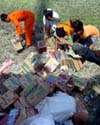| . |  |
. |
Bantul, Indonesia (AFP) Jun 1, 2006 The death toll rose to 6,234 while the number of those hurt in the quake more than doubled to some 46,000, with more than 33,000 suffering serious injuries, the social affairs ministry said. Hospitals in the quake zone were still overwhelmed five days after Saturday's 6.3-magnitude temblor rocked Central Java, with patients spilling out from wards and badly in need of care, a UN official said. "Most of the hospitals are functioning, but are overloaded. There is a lack of space in the hospitals," said Charlie Higgins, the UN's humanitarian coordinator in Yogyakarta, the main city in the quake zone. "It's getting out the basic medical supplies to the hospitals that is important," he told AFP. Foreign rescue teams from China, Qatar, Singapore, and the United States among others have set up field hospitals and lent a hand to help overworked staff at area hospitals. Higgins said most of those who needed life-saving emergency treatment had been cared for and that aid agencies were now concerned about the long term. "They are trying to move people out from the wards and beds to their homes. But for some, the homes are ruined," he said. "So that is a problem." More than 139,000 homes were destroyed or damaged in the quake, according to the social affairs ministry. At the bustling Bantul General Hospital, the co-ordinating doctor, Hidayat, said the facility was treating about 50 patients, some of whom were lying on cots in the entrance. "That's because they don't have a house to go home to," Hidayat said. Sumartini, 33, lay on her side with her right leg in a temporary splint made of cardboard. She had been there since Saturday without surgery. "I'm waiting for a doctor from Singapore," said Sumartini, whose husband was also at the hospital with eye and leg injuries. Rescue teams were still looking for bodies, with a team of six Spanish volunteers aided by sniffer dogs combing through the rubble of a village market in hard-hit Bantul district, the Detikcom online news service said. Amid complaints from residents that aid has been too slow to arrive, Indonesian officials have defended the relief effort while the UN's Higgins offered a relatively upbeat assessment of the situation. "On the whole, there are enough resources to deal with the emergency," he said. Wet weather in recent days and clogged roads have hampered distribution of needed supplies by trucks and some survivors were bracing for a sixth night without shelter. Military and rescue helicopters are delivering badly-needed food to isolated areas, and transporting the injured to hospital. But hundreds of survivors converged on the governor's complex in Yogyakarta hoping to pick up extra rations -- sacks of rice and parcels of instant noodles -- for their devastated villages. "We need everything. Our village is the most destroyed in the area, so we want anything we can get," said Wakidgian, 42, from the flattened mountainous village of Dlingo in Bantul. "We come from an isolated area close to the mountains, so not much help has reached us," said another survivor, Mardain, 32, who had waited for hours for his number to be called. The World Health Organization (WHO), for its part, urged donor countries to send the "appropriate medicines" to the quake zone. "There are shortages of some very specific medicines and supplies, including orthopaedic supplies, anaesthetics and antibiotics," Georg Petersen, the WHO's country representative for Indonesia, said in a statement. "Only appropriate medicines should be sent, and that too in consultation with the national authorities. Previous experience of disasters has shown that inappropriate contributions have only led to confusion." The WHO said there also was a lack of bed sheets, mattresses and other "consumable medical equipment" like stitching materials, sterile kits for surgeries and x-ray films. Vice President Yusuf Kalla, who arrived in the disaster zone to oversee relief efforts, said food aid would be delivered once a month, not on a daily basis, to ease the logistical difficulties for local officials. "That way, the government will only have to work once a month," he was quoted by the state Antara news agency as saying, explaining that each family of four would receive 50 kilograms (110 pounds) of rice per month. Related Links  Jakarta (AFP) Jun 1, 2006
Jakarta (AFP) Jun 1, 2006 Indonesian Vice President Yusuf Kalla said Thursday that food aid in the quake zone should be delivered once a month, not on a daily basis, to ease logistical difficulties with the relief effort. |
|
| The content herein, unless otherwise known to be public domain, are Copyright 1995-2006 - SpaceDaily.AFP and UPI Wire Stories are copyright Agence France-Presse and United Press International. ESA PortalReports are copyright European Space Agency. All NASA sourced material is public domain. Additionalcopyrights may apply in whole or part to other bona fide parties. Advertising does not imply endorsement,agreement or approval of any opinions, statements or information provided by SpaceDaily on any Web page published or hosted by SpaceDaily. Privacy Statement |